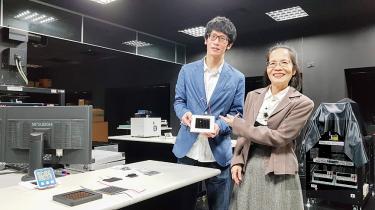
Members of National Central University’s (NCU) Research Center for New Generation Photovoltaics yesterday announced that they have developed efficient perovskite solar cells that work in room lighting and are working with groups in Japan to improve verification techniques for cell efficiency.
Using perovskite — a calcium titanium oxide mineral whose chemical structure can be reproduced in the laboratory from various elements — to develop solar cells is a competitive field, as cell efficiency has skyrocketed from 3.8 percent in 2009 to 23.7 percent last year, said Wu Chun-guey, a chemistry department professor and director of the center.
Her team has developed perovskite solar cells up to 100m2 that can be used in room lighting to charge simple laboratory devices such as hygrometers, Wu said.
The cells can be made into thin-film layers, so the team would like to collaborate with other researchers to develop applications for space technology, she said.
A perovskite solar cell has a layer of lead — less than 0.01 percent of its total composition — but the layer can be dissolved by a chemical solution, making it easier to recycle than silicon solar cells, she said.
In 2012, the chemistry department received funding from the Ministry of Science and Technology to establish an advanced laboratory of accommodation and research for organic photovoltaics, and since then, the team has been working with Japan’s National Institute of Advanced Industrial Science and Technology and others to develop better ways of verifying the efficiency of solar cells, she said.
Taiwan, Japan, South Korea, the US, Germany and Italy are the world’s leaders in developing the techniques, Wu added.
In 2017, the department’s Photovoltaic Efficiency Verification Laboratory became the nation’s first university laboratory to obtain ISO/IEC 17025 accreditation from the Taiwan Accreditation Foundation for solar cell calibration.
To test cell efficiency under various lighting conditions, the laboratory is equipped with a solar simulator, indoor lighting and LED lighting systems, said Chen Chia-yuan, an assistant professor in the department, adding that the LED-lit environment is key to solar cell development.
Tokyo-based Ishikawa Trading Co has asked the laboratory to test sample solar cells, and a contract is expected to be signed later this year, he said.